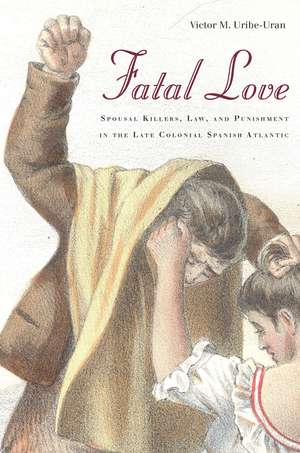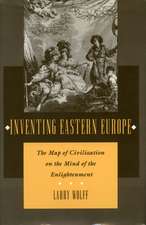Fatal Love: Spousal Killers, Law, and Punishment in the Late Colonial Spanish Atlantic
Autor Victor Uribe-Uranen Limba Engleză Hardback – 15 dec 2015
One night in December 1800, in the distant mission outpost of San Antonio in northern Mexico, Eulalia Californio and her lover Primo plotted the murder of her abusive husband. While the victim was sleeping, Prio and his brother tied a rope around Juan Californio's neck. One of them sat on his body while the other pulled on the rope and the woman, grabbing her husband by the legs, pulled in the opposite direction. After Juan Californio suffocated, Eulalia ran to the mission and reported that her husband had choked while chewing tobacco. Suspicious, the mission priests reported the crime to the authorities in charge of the nearest presidio.
For historians, spousal murders are significant for what they reveal about social and family history, in particular the hidden history of day-to-day gender relations, conflicts, crimes, and punishments. Fatal Love examines this phenomenon in the late colonial Spanish Atlantic, focusing on incidents occurring in New Spain (colonial Mexico), New Granada (colonial Colombia), and Spain from the 1740s to the 1820s. In the more than 200 cases consulted, it considers not only the social features of the murders, but also the legal discourses and judicial practices guiding the historical treatment of spousal murders, helping us understand the historical intersection of domestic violence, private and state/church patriarchy, and the law.
For historians, spousal murders are significant for what they reveal about social and family history, in particular the hidden history of day-to-day gender relations, conflicts, crimes, and punishments. Fatal Love examines this phenomenon in the late colonial Spanish Atlantic, focusing on incidents occurring in New Spain (colonial Mexico), New Granada (colonial Colombia), and Spain from the 1740s to the 1820s. In the more than 200 cases consulted, it considers not only the social features of the murders, but also the legal discourses and judicial practices guiding the historical treatment of spousal murders, helping us understand the historical intersection of domestic violence, private and state/church patriarchy, and the law.
Preț: 483.44 lei
Preț vechi: 596.84 lei
-19% Nou
Puncte Express: 725
Preț estimativ în valută:
92.50€ • 96.59$ • 76.39£
92.50€ • 96.59$ • 76.39£
Carte tipărită la comandă
Livrare economică 15-29 aprilie
Preluare comenzi: 021 569.72.76
Specificații
ISBN-13: 9780804794633
ISBN-10: 0804794634
Pagini: 456
Dimensiuni: 152 x 229 x 30 mm
Greutate: 0.73 kg
Editura: Stanford University Press
Colecția Stanford University Press
ISBN-10: 0804794634
Pagini: 456
Dimensiuni: 152 x 229 x 30 mm
Greutate: 0.73 kg
Editura: Stanford University Press
Colecția Stanford University Press
Recenzii
"A highly valuable contribution to the history of social violence and Spanish law both in the metropolis and the colonies."—Eric Van Young, University of California, San Diego
"This book is exceptional in its archival coverage as well as its historiographical depth. Its revisionist interpretations of existing scholarship will be welcomed by scholars."—Ann Twinam, The University of Texas at Austin
Notă biografică
Victor M. Uribe-Uran is Associate Professor of History and of Law at Florida International University. He is the author of Honorable Lives: Lawyers, Family, and Politics in Colombia, 1780–1850 and the editor of State and Society in Spanish America during the Age of Revolution.
Descriere
A revisionist and highly readable social and legal history of spousal murder in Spain, Colombia and Mexico, challenging dominant notions about the evolution of punishment and the character of legal, ethnic and gender relations and the culture of honor in the late colonial Spanish Atlantic.















